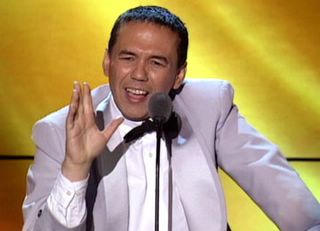[My thanks go out to Pandagon for pointing out this website to me.]
The other day, I posted about the ridiculous Ben Shapiro and his column "boycotting" the Oscars for having the temerity to praise Brokeback Mountain. Granted, the Oscar nominations have not even been announced yet, but Ben knows what he's doing. I'm sure the Oscars, one of the world's most popular telecasts, will dearly miss this lone viewer, who has to stop watching at 8:30 anyway because it's past his bedtime.
I mentioned back then that Ben had been a member of the Daily Bruin (for which I served as an assistant Arts & Entertainment editor back in the late 90's), and that he had began writing his hate-filled right-wing diatribes back in his UCLA days.
We all know that one of the main tenets of the Righty Blogs and their ilk is the "liberalization" of education. They fear that young people are indoctrinated with radical left-wing values when they matriculate at institution's of higher learning. Personally, I see their thinking as backwards. Rather than attempt to place faculty who have staunchly conservative viewpoints in universities and make shrill attacks on campus liberals, yabbos like Ben ought to consider why almost all of the nation's smartest and best-educated people hate their guts.
I mean, Ben's no great thinker himself. Here's a quote from his column of November 30th, 2005:
The pro-choice crowd has never wanted abortion to be rare. Were abortion rare, women considering abortions would feel subtle societal pressure to preserve the life growing within them. Such societal pressure would create a "coercive" environment for women, inhibiting their ability to choose. For abortion to thrive, it must be common.
Huh? Don't most vocal pro-choice advocates represent women's rights and health organizations? Why would they want more women to undergo an invasive and potentially traumatizing surgical procedure? To prevent women from feeling subtle (read: invisible) societal pressure towards not having abortions?
So, you see what I'm saying...A guy with as shaky a grasp on reality and logic like Ben probably shouldn't be angrily calling out Ph.D's about their political leanings. In this column, he has just called out the entire U.S. population holding pro-choice beliefs (a majority last I checked) as unrepentant baby-killers.
Anyway, with Ben being hired away by Townhall, it seems like the issue of liberal UCLA professors has become kind of a big deal in the righty blogsophere. Which brings me to this thoroughly disgusting smear website, UCLA Profs.com.
UCLA Profts dot com highlights outspokenly anti-war, anti-Bush or simply left-wing UCLA professors and attacks their beliefs, methods and in many cases, personalities. It is cruel and pointless, an attempt to intimidate educators into...Well, I don't know what. Into not thinking the way they want to think? Into making undergraduate classes into Fox News broadcasts, presenting two sides of every issue without making any sort of judgements or analysis?
To my mind, it doesn't even matter if there's a specific goal for the founders of this website. They just want to silence those who oppose them, particularly when the opposition is really smart and holds a position of respect in the community. That just makes them crazy.
As our motto attests, UCLAProfs.com is a long-term project dedicated to exposing UCLA’s most radical professors. The extensively researched profiles you will find here are proof of an increasingly radical faculty. As a large number of the profiles also demonstrate, these professors are actively proselytizing their extreme views in the classroom, whether or not the commentary is relevant to the class topic.
I warn you, just because they say it...doesn't mean they do any of this stuff. The profiles are long, and they do include information like the syllabi of the professor's classes and Daily Bruin articles they may have written or for which they provided quotes. But they don't "prove" anything. They demonstrate that students are exposed to radical ideas in the classroom, but presenting young minds with a wide range of ideas in a classroom is not proselytizing. It's educating, you fucking idiots!
This site is run by scumbags with no interest in the truth or in the philosophy of education. They just want to make a name by smearing good professors and spreading lie-filled rhetoric about librul indoctrination.
Don't believe me?
If you can help UCLAProfs.com collect information about abusive, one-sided, or off-topic classroom behavior, we’ll pay you for your work.
To see if we need information on the professors you've already taken, or will be taking this winter quarter, call 310-210-6735, or email bruinalumni (AT) bruinalumni.com today, and you could be paid tomorrow.
Yikes. It's bribery. Tell us stuff about your professors, poor college students, and we'll pay you. So what kind of back-end am I looking at for spying on my professors?
Full, detailed lecture notes, all professor-distributed materials, and full tape recordings of every class session, for one class: $100
(Note: lecture notes must make particular note of audience reactions, comments, and other details that will properly contextualize the professor's non-pertinent ideological comments. If the class in question is ongoing or upcoming, UCLAProfs.com will provide (if needed) all necessary taping equipment and materials.)
Even if you didn’t take detailed notes or attend class regularly, you can still help UCLAProfs.com by alerting us to a problem professor not already in our database or target list (below). This is a particularly attractive option for students wanting to report past classes in which their notes and attendance did not match UCLAProfs.com's high record-keeping standards. Simply provide us the name, your notes from the class (or substitute your current recollections), and any other materials you still retain, and we’ll pay you $10 for the tip.
Disgusting and disgraceful. They want to change getting an education into a kind of perverted John Ashcroft TIPS program, where rather than listening to what their professors say and considering how they feel about this information, students are encouraged to monitor their professors. To make sure they don't say anything mean about Our Beloved Leader, George Bush.
What really set me off is that they're going after a professor whose classes I loved back in school.
I studied for an English minor back in UCLA, so I had to take a bunch of upper-division Shakespeare classes. I had two Shakespeare professors - one was an obnoxious, boring lecturer whose classes I would dread, and the other was Dr. Robert Watson. Watson was an engaging lecturer and just a plain old interesting guy, and his classes were my favorites during the two semesters I studied under him.
What I liked about Waston's class was that he didn't try to contemporize Shakespeare for a modern crowd...He didn't bother to explain, a lot of the time, why Shakespeare is relevant now or what impact he had on whatever literary movements. It was more focused on making sense of the language and writing in context, focusing on how an Elizabethan audience would have understood the guy's poetry. Great stuff.
I didn't even know, during my association with Watson, about his background or his politics. We just discussed A Winter's Tale. But he has been picked out by UCLA Profs for lies and abuse. Not cool.
Professor Robert Watson has been, for the majority of his academic career, a fairly indistinguishable part of the English department faculty. In fact, a bare-bones review of his academic record shows nothing questionable. In fact, Watson’s role as a long-term Shakespeare scholar makes him as an unfashionable retrograde in a field that increasingly disregards the Bard’s centrality.
Okay, this opening paragraph is totally inaccurate. I just told you why, previous to 2000, when this article begins its analysis, that Watson was a very distinguishable part of the English Department Faculty. I remember him clearly 7 years after taking his class. Maybe his past is indistinguishable because they aren't paying off any students from before 2000 to remember him?
Also, no reasonably-sized undergraduate English department in America doesn't have a professor who knows Shakespeare. If the field disregards the Bard's centrality, who does it now focus on? Joyce? Keats? The Great Works of Sean Hannity?
The article spends most of its time talking about Watson's father, Goodwin Watson, another academic. Goodwin Watson apparently was hounded in his day by the House of Un American Activities Committee (commonly abbreviated as HUAC, but called HCUA in the article because they're fucking idiots) for being a Communist sympathizer. In fact, he was under investigaton and scrutiny because he was suspected of teaching classes and introducing students to radical lefty ideas.
Having aired anti-capitalist, anti-war, pro-indoctrination, pro-activism ideas, not simply to friends and neighbors, but also in print and in public forums, Watson was, at the time of the HCUA’s scrutiny, a Communist in thought and deed, if (presumably) not on any official party roster. Moreover, Watson’s political commitments could not be cast as collegiate excesses or the wild words of youth, given that the first cited examples of his political radicalism began at the not-so-tender age of 37.
Is it wrong to air anti-capitalist, anti-war or pro-activism ideals in the media? (As for indoctrination, it seems to me that UCLA Profs' mission to eliminiate college faculty who disagree with them is a far more pernicious attempt at indoctrination than teaching a class).
UCLA Profs actually doesn't get the irony. That their ancestors on the Right hounded Goodwin Watson, altering his son's perspective, and now they have come forward as a new generation ready to threaten and intimidate an educator for trying to inform the next generation.
At any rate, the very American democracy that Robert Watson scorns today eventually saved his father. As it happened, after the Kerr Committee’s decision, a rider was attached to a $134 million deficiency appropriation bill passed in the House. The rider stated, in short, that no part of any Congressional funding could be used to pay the salary of one Goodwin Watson. While the bill was passed quickly, it was rejected unanimously by the Senate on substantive procedural grounds. This back-and-forth in which the House passed the bill, only to see it rejected by the Senate, then occurred four more times, until the Senate, dismayed at the prospect of financially punishing thousands of federal employees to protect one, acquiesced and passed the bill. President Roosevelt, while denouncing the bill as “unconstitutional,” took the same pragmatic approach and signed it into law. But on June 3, 1946, the Supreme Court, in United States vs. Lovett, unanimously vindicated both Roosevelt’s view and Watson’s personal fight, finding that the firing constituted an unconstitutional bill of attainder and awarded Watson back pay.
See? Eventually, years after the Right had tried to ruin his life because of baseless accusations and outright lies, he was cleared! So what is his son so upset about? What a baby!
So, they bash Watson's Dad, make him look like a Communist even after he was cleared by the Supreme Court, and then they attack some Watson editorials from The Daily Bruin.
Whether it was the anger over Bush’s election, the thrill of seeing his name in newsprint, or even the “emotional involvement” of the anti-Inauguration event, it seemed as though the January 2001 articles opened floodgates that had previously been holding back Watson’s politically-oriented output. Over the fifteen months (including three quiet months of summer), Watson would spew forth no less than eleven Viewpoint submissions or letters to the editor.
The horror! You mean, this man, this English Professor and member of the UCLA Community, wrote letters to the editor of the school newspaper! Okay, that's it! I've read enough! String this guy up by his pinky toes!
On February 21, 2001, Watson fired the first salvo with a letter against Ben Shapiro’s Daily Bruin column, “Tolerance Makes for False Gods.” This marked the start of what would eventually be a long and (on Shapiro’s part, at least) cogent battle of political views.
Yeah, I'm sure Ben comes off as exceptionally cogent. Let's just take a look at that column, shall we?
American liberalism has replaced a system of morals and values with a new god. His name is Tolerance. Tolerance is an easy-going guy. He'll accept just about anything you choose to do. You want to commit adultery? OK by Tolerance. Pedophilia? A little sicker, but it's all right too. Murder? Well, you must have had a tough childhood.
Yeah, screw tolerance! I'm sick of tolerating all these pedophiles feeling up my kids that these liberals refuse to do anything about!
The overwhelmingly liberal American media portrays anyone who believes in God as foolish at best, and usually goes as far as to call them closed-minded and extremist. Why? Because intolerance of anything, even of corrupt morals, is a clear violation of the law of Tolerance, which states that you cannot judge anyone.
Yeah, I mean, what tolerant asshole said "Judge not, lest ye be judged." Some dumb liberal, I'm sure. Probably one of those long-haired hippie types. Or "As you do unto the least of my bretheren, so you do unto me." What an asshole. Everyone knows intolerance and moral judgement is What Jesus Would Do.
Ben then goes down a list...People in the Congregation of Tolerance vs. People in the Congregation of God. Bear in mind, he's a freshman in college at this point. 17, 18 years old. Then think to yourself - what must this poor boy's parents have done to him?
For the congregation of God – Dr. Laura Schlessinger. Before you cringe, remember what she represents – a system of God-given morals. Remember when she called the homosexual lifestyle "deviant"? She was berated with a media hailstorm. Every major newspaper carried ads proclaiming Dr. Laura intolerant. Radio and television stations throughout the country discussed her "bigoted" views. She was eventually forced to recant on pain of the loss of her livelihood. Never mind that Schlessinger watered down the Biblical view of homosexuality: "It is an abomination."(Leviticus 18:22) Never mind that many major religions condemn homosexuality. How could Schlessinger be so horrible? How could the religious right judge?
Oh, Benny, did you back the wrong horse...
It goes on and on like this. You get the idea...This article is about as "cogent" as a post-game interview with Shaq.
I won't even get into Watson's response. Really, I don't even feel like it's worth responding to a guy like Ben in the student newspaper. If he's in one of your classes and you want to try and show him a more reasonable way of seeing the world, that's fine, but just responding to him in the newspaper grants his idiocy a form of legitimacy.
I'm thinking that perhaps these silly twits at UCLA Profs.com (featuring on its advisory board...why, it's Ben Shapiro!) don't even understand the significance of their actions. They just think it's a hoot to call out professors they don't like online. They don't realize they are marching in lockstep with a long, ongoing effort to silence educators and, accordingly, to stifle free speech.
Or maybe they know just what they're doing. They're perfectly aware of what big assholes they sound like spewing all this nonsense, and they know the only way to make it seem like they're intelligent is to intimidate anyone smarter into shutting up.










